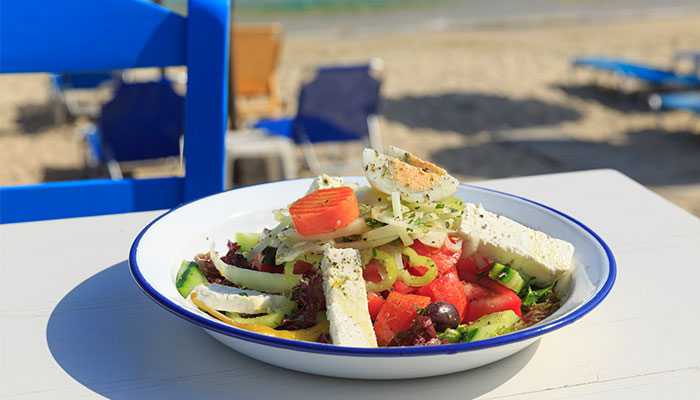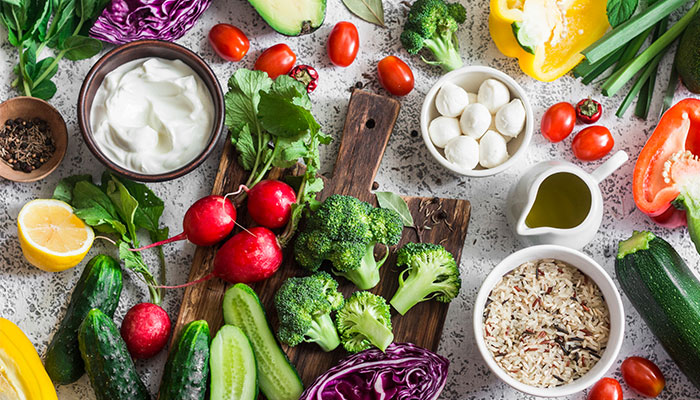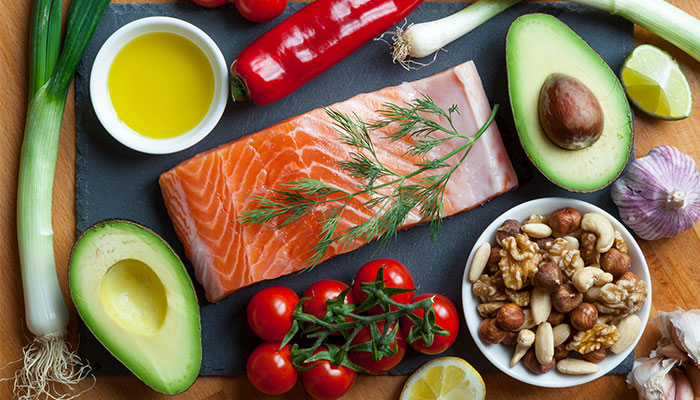Lives have been radically transformed but our health shouldn’t suffer as a result – in fact, given we are largely confined to our homes and with dining-out not an option, this period of isolation could be ideal for jump-starting some better eating habits, says Macquarie University Hospital dietitian Dr Juliana Chen.

Eat like a Mediterranean: eating well is key to good mental health and research shows a diet high in vegies and fish can cut the liklihood of depressive symptoms, says dietitian Dr Juliana Chen.
We all know eating well is vital for good health. Research has shown that globally, poor diets account for nearly one in every five deaths (much higher than the COVID mortality rates).
And it is arguably even more important in an unprecedented time like this to eat healthily, says Chen.
“With the many changes we have undergone in our individual and our family’s lives, we are at risk of engaging in poor habits such as overeating, boredom or comfort eating and drinking, choosing poor quality foods and snacks, and not doing enough physical activity – all of which can negatively impact our physical and mental health and lead to weight gain,” Chen says.
Eating well is key to good mental health, and a growing body of research shows that sticking to a high quality diet that follows Mediterranean dietary principles, with plenty of vegetables and fish, reduces the likelihood of depressive symptoms.
What we feed our bodies also then feeds our brains and minds.
On the other hand, consuming excessive amounts of red or processed meats, sweets, refined grains, high fat dairy and a low intake of fruits and vegetables is associated with increased risk of depression.
“What we feed our bodies also then feeds our brains and minds,” Chen says.
“While it may feel counterintuitive, the coronavirus lockdown is a fantastic time and opportunity for us and our families to set up new habits for our health.”
Below are tips from Chen to ensure that at the least, we can emerge at the other side without harm to our health – and maybe in even better health than when the crisis began.
Set up a routine
With the world outside in a coronavirus-induced state of constant change, it’s important for the mental and physical health of everyone in the family to maintain routines, says Chen.
Routines can help us to maintain a sense of control by providing structure and reliability to our days.
“This is also important because working and schooling our kids at home is the new norm, so routines will help us to maintain productivity and ensure we eat, rest and exercise well,” Chen says.
- Coronavirus contact-tracing app raises privacy concerns
- Your at-home crash course in English literature
“This means sticking to three regular meals a day which can also help us avoid hunger during the 3pm-4pm period that leads us to reach for the biscuits, chips and chocolates.
“Structure in break times mid-morning and afternoon to have a healthy snack and to engage in some physical activity.
“A good routine also means clocking off work at a reasonable time, not only to maintain work-life balance, but so that time can be made to prepare home-cooked meals for dinner and for rest.”
Plan, plan, plan
Start by planning your meals and (healthy) snacks for the week and write a shopping list of everything you need to buy.

Go for a rainbow: aim for a variety of colours in fresh produce and when buying canned and frozen food, opt for reduced salt, says Chen.
Having a list has further advantages during the coronavirus crisis, Chen points out. “It will mean you can beeline straight to the groceries you need, while keeping to social distancing measures, and be in and out of the shop as quickly as possible.
“This will be helped by the fact that the main groceries you need – that is, the fresh produce – are typically stocked around the outer section of a supermarket.”
Given the panic buying that has led to scarcity of some groceries, Chen says it pays to be flexible. “The exact product you’re after might not be there, so it helps to write down some alternate options on your list.”
What to buy
Ensure you have a variety of vegetables and legumes - aim for a rainbow of colours and types, including leafy green vegetables. These can be fresh, frozen or canned – they are all very nutritious, Chen says – though look for tinned options with no added or reduced salt.
Also include on your shopping list fruits, poultry, eggs, fish (again, fresh, frozen or tinned is fine) and other seafood, lean meats, wholegrain cereals, rice, pasta, noodles, reduced fat dairy and olive oil.
“These are all foods that will help to keep your diet well-balanced and healthy and keep you physically and mentally well,” Chen says.
Healthy snacking
Working from home lends itself to frequent wandering to the fridge or pantry, either because we’re bored, in need of a break, or it’s just so close by, Chen says. Often these are cravings, in which case regular meals can help. Also try waiting it out 20 minutes by distracting yourself with another activity or having a drink of water.
This stressful and anxious time can also bring out patterns of emotional or comfort eating. Rather than continually fighting off temptation, clear out your pantries and don’t keep stores of discretionary foods (chips, biscuits, cakes, chocolates, lollies).
Cut up the fruit and veggies the night before, and still pack a lunch box, for the adults as well as the kids.
Instead, stock up on healthy snacks, including nuts, reduced fat Greek yoghurt, fruit, vegie sticks and hummus dip, hard-boiled eggs, wholegrain crackers with ricotta or cottage cheese, homemade popcorn and vegetable soups.
“A good tip is to cut up the fruit and veggies the night before, and still pack a lunch box, for the adults as well as the kids,” Chen says.
“And yes you can still enjoy those discretionary foods, but try to limit to just buying a small packet/bar of something to share among the whole family once or twice a week on grocery shopping day (don’t stockpile them in the pantry), and eat these slowly, mindfully and enjoy them without guilt.”
Choose water not alcohol
Drink plenty of water to stay hydrated, aiming for two to three litres a day.
“Water is important for helping our bodies to get rid of waste and toxins and regulating our body temperature,” Chen says.
“Keep a bottle of water filled up at your home work station. Add some herbal/fruit tea infusions for some extra flavour (without the sugar).
- Five things you can do to protect your hearing at any age
- House-bound shoppers trigger new online retail frenzy
“Thirst can often be mistaken for hunger so maintaining adequate hydration can also help you ward off some of the munchies and overeating.”
Chen cautions against turning to alcohol in these anxious times, pointing to an 86 per cent spike in alcohol sales during the crisis.
“People can turn to alcohol as a way to self-medicate, but alcohol can in fact increase anxiety,” she says.
“Aim to have a few alcohol free nights to get you started on cutting down your intake, and again, keep it out of the house.”
Check out the NHMRC alcohol guidelines here.
Learn new skills
The time has never been better to learn how to cook, or to ramp up the skills you already have.

Cook and save: home-cooking right now is more economical and healthier than ordering take-away, says Chen.
“Pull out the recipe books, or log onto YouTube cooking channels, and get the whole family involved in a love for cooking,” says Chen, who also recommends checking out smart eating recipes on the Dietitians Association of Australia website.
“Then sit down as a family to enjoy the meal at the dinner table – and without distractions of the TV or phones.”
Improving confidence in cooking at home is associated with healthier eating patterns.
Particularly with the financial uncertainty many of us could be facing, home-cooking will be a much more economical and healthy way of feeding you and your family, rather than ordering in food.
“Research has shown that improving confidence in cooking and food preparation at home is associated with healthier eating patterns, particularly with greater fruit and/or vegetable intake and low energy intake among adults, as well as improvements in child feeding practices,” Chen says.
If you are having to choose takeaway/home-delivery for the night, try to opt for stir-fried or grilled rather than deep-fried, and include at least one dish that contains lots of veggies, advises Chen
Exercise
Gyms are closed, but neighbourhoods are not. Aim to do 30 minutes of moderately intense physical activity on most days of the week (accumulating 150 minutes per week), or split it into two shorter walks to break up your time sitting down.
“Pop out for a brisk walk instead of wandering to the fridge,” says Chen. “And as you’re walking, why not call a friend or listen to music, or take your kids or pet out with you.
“This can help to maintain your social connectedness and support your mental health.”
Get support
“You are not alone in this,” says Chen.
“Reach out for help from family and friends. Your local Accredited Practising Dietitian is also available during this time to support and give you tailored and specialised dietary advice for managing in this COVID period, especially if you have any weight loss goals and to manage and prevent chronic disease.”
Accredited Practising Dietitian Dr Juliana Chen and the Healthy Weight Clinic team of endocrinologists and exercise physiologists are available at the MQ Health clinics. To make an appointment phone 9887 8899 (Telehealth options are available.)



